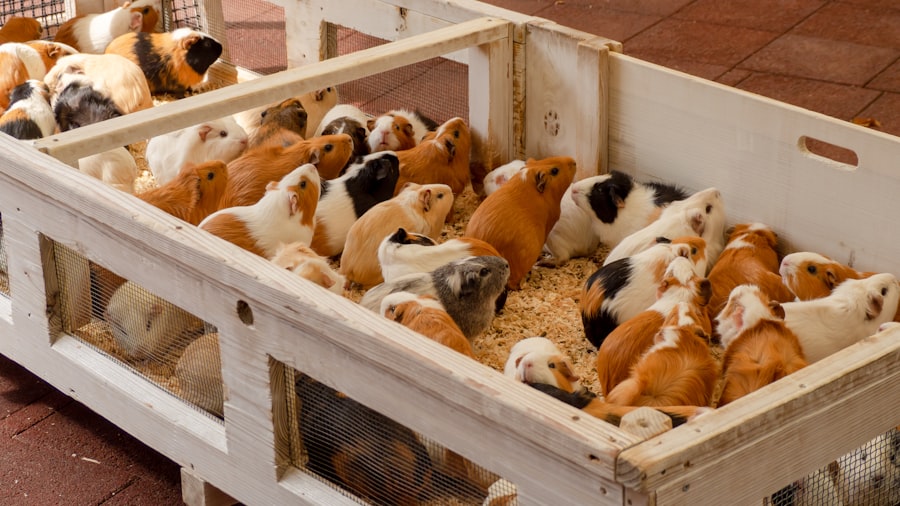Keeping guinea fowl and chickens together can be a rewarding and beneficial experience for poultry enthusiasts. Guinea fowl are known for their pest control abilities, while chickens are valued for their egg production. By combining these two species, you can enjoy the benefits of both.
Personally, I have had experience keeping guinea fowl and chickens together on my farm. I found that they complemented each other well and created a harmonious environment. The guinea fowl helped control pests such as ticks and insects, while the chickens provided a steady supply of eggs. It was fascinating to observe their interactions and see how they formed a cohesive flock.
Key Takeaways
- Keeping guinea fowl and chickens together can be beneficial for both species.
- Guinea fowl are more independent and active than chickens, but can also be aggressive towards them.
- Benefits of keeping guinea fowl and chickens together include pest control and increased flock diversity.
- Factors to consider before keeping them together include space, temperament, and predator protection.
- The ideal number of guinea fowl to keep with chickens is 2-4 for every 10 chickens.
Understanding the Nature of Guinea Fowl and Chickens
Guinea fowl and chickens have distinct differences in behavior and temperament. Guinea fowl are known for being more independent and alert, while chickens tend to be more social and docile. Guinea fowl are excellent foragers and have a strong instinct to hunt insects and small rodents. Chickens, on the other hand, are more focused on scratching the ground for food.
When kept together, guinea fowl and chickens can form a symbiotic relationship. The guinea fowl’s vigilant nature can help protect the flock from predators, as they will sound an alarm at the first sign of danger. Chickens, with their social behavior, can provide companionship to the guinea fowl and help them feel more secure.
The Benefits of Keeping Guinea Fowl and Chickens Together
One of the main benefits of keeping guinea fowl and chickens together is pest control. Guinea fowl are natural insect hunters and can significantly reduce the population of ticks, flies, and other pests in your yard or farm. This can help protect both your poultry and yourself from diseases carried by these pests.
Another benefit is increased egg production. Guinea fowl are known for their ability to lay eggs, and when kept with chickens, they can inspire the chickens to lay more eggs as well. The presence of guinea fowl can create a stimulating environment for the chickens, leading to increased productivity.
Additionally, keeping guinea fowl and chickens together can provide entertainment value. Guinea fowl are known for their unique vocalizations and quirky behavior, which can be entertaining to watch. Their interactions with the chickens can also be fascinating to observe, as they establish a pecking order and form social bonds.
Factors to Consider Before Keeping Guinea Fowl and Chickens Together
Before deciding to keep guinea fowl and chickens together, there are several factors to consider. First, you need to ensure that you have enough space to accommodate both species. Guinea fowl require more space than chickens, as they are more active and need room to roam. It is recommended to provide at least 10 square feet per bird for guinea fowl, and 4 square feet per bird for chickens.
Compatibility of breeds is another important factor to consider. Some chicken breeds may be more aggressive or territorial, which can lead to conflicts with guinea fowl. It is best to choose chicken breeds that are known for their docile nature and ability to get along with other species.
Noise level is also something to consider. Guinea fowl are known for their loud calls, which can be disruptive in residential areas. If you live in a neighborhood with noise restrictions, it may not be suitable to keep guinea fowl and chickens together.
The Ideal Number of Guinea Fowl to Keep with Your Chickens
The recommended ratio of guinea fowl to chickens is one guinea fowl for every four to six chickens. This ratio allows for a balanced flock and ensures that the guinea fowl have enough social interaction with their own species while still integrating well with the chickens.
When introducing new birds, it is important to do so gradually and in a controlled manner. This helps prevent any conflicts or stress among the birds. It is recommended to keep the new birds in a separate enclosure within sight of the existing flock for a few weeks before allowing them to mingle. This allows the birds to become familiar with each other’s presence and reduces the chances of aggression.
Housing Requirements for Guinea Fowl and Chickens

When housing guinea fowl and chickens together, it is important to provide a coop and run that meets the needs of both species. The coop should be secure and predator-proof, with adequate ventilation and nesting boxes for the chickens.
For guinea fowl, it is important to provide roosting poles at different heights, as they prefer to roost higher than chickens. Guinea fowl also require more space in the run, as they are more active and need room to forage and explore.
Feeding Guinea Fowl and Chickens Together
Guinea fowl and chickens have different dietary needs, so it is important to provide a balanced diet for both species. Guinea fowl require a higher protein diet than chickens, as they are more active and have a higher metabolism. It is recommended to feed guinea fowl a game bird or turkey feed that contains at least 24% protein.
Chickens can be fed a standard layer feed that contains around 16% protein. However, it is important to monitor their calcium intake, as guinea fowl do not require as much calcium as chickens. Providing oyster shell or crushed eggshells separately for the chickens can help ensure they get enough calcium without overfeeding the guinea fowl.
Health Concerns When Keeping Guinea Fowl and Chickens Together
When keeping guinea fowl and chickens together, there are some health concerns to be aware of. Disease transmission can be a risk, as both species can be susceptible to certain diseases. It is important to practice good biosecurity measures, such as regular cleaning and disinfection of the coop and run, to minimize the risk of disease transmission.
Parasites can also be a concern, as both guinea fowl and chickens can be affected by external parasites such as mites and lice. Regular inspection and treatment for parasites is essential to keep the birds healthy.
Preventative measures such as vaccination and regular health checks can help minimize the risk of disease and ensure the overall well-being of the flock.
Managing Conflicts between Guinea Fowl and Chickens
Conflicts between guinea fowl and chickens can arise, especially during the integration process or when establishing a pecking order. Common issues include aggression, bullying, and territorial behavior.
To address these conflicts, it is important to provide enough space for the birds to establish their own territories. This can be done by providing multiple feeding and watering stations, as well as separate roosting areas.
If conflicts persist, it may be necessary to separate the guinea fowl from the chickens temporarily until they have established a more harmonious relationship. This can be done by using temporary fencing or creating separate enclosures within the same area.
Is Keeping Guinea Fowl and Chickens Together Right for You?
Keeping guinea fowl and chickens together can be a rewarding experience for poultry enthusiasts. The benefits of pest control, increased egg production, and entertainment value make this combination appealing. However, it is important to consider factors such as space requirements, breed compatibility, and noise level before making a decision.
By understanding the nature of guinea fowl and chickens, providing appropriate housing and feeding strategies, and managing conflicts effectively, you can create a harmonious environment for both species. With proper care and attention, keeping guinea fowl and chickens together can be a successful and enjoyable endeavor.
If you’re considering keeping chickens and guinea fowl together, you may be wondering if it’s possible to have just one guinea fowl with your chickens. According to a helpful article on Poultry Wizard, it is indeed possible to keep a single guinea fowl with your chickens. The article provides valuable insights on how to introduce the guinea fowl to your existing flock and ensure a harmonious coexistence. To learn more about creating the perfect environment for your feathered friends, check out the article on Poultry Wizard’s farmhouse chicken coop.
FAQs
What is a guinea?
A guinea is a small domesticated bird that is often kept as a pet or for its meat. They are known for their distinctive calls and are often used as a natural pest control method in gardens and farms.
Can guineas be kept with chickens?
Yes, guineas can be kept with chickens. They are both social birds and can coexist peacefully as long as they have enough space and resources.
Can you keep just one guinea with your chickens?
It is not recommended to keep just one guinea with your chickens. Guineas are social birds and thrive in groups. Keeping just one guinea can lead to loneliness and stress, which can negatively impact their health and behavior.
What are the benefits of keeping guineas with chickens?
Keeping guineas with chickens can provide several benefits. Guineas are known for their ability to control pests such as ticks, fleas, and grasshoppers. They can also alert chickens to potential predators and help protect the flock. Additionally, guineas and chickens can form a symbiotic relationship, with guineas helping to keep the coop clean by eating insects and other debris.
What are the potential drawbacks of keeping guineas with chickens?
While there are many benefits to keeping guineas with chickens, there are also potential drawbacks. Guineas can be noisy and their calls may disturb neighbors. They can also be more flighty and difficult to handle than chickens, which can make them more challenging to care for. Additionally, guineas may have different dietary needs than chickens, which can require additional attention and resources.
Meet Walter, the feathered-friend fanatic of Florida! Nestled in the sunshine state, Walter struts through life with his feathered companions, clucking his way to happiness. With a coop that’s fancier than a five-star hotel, he’s the Don Juan of the chicken world. When he’s not teaching his hens to do the cha-cha, you’ll find him in a heated debate with his prized rooster, Sir Clucks-a-Lot. Walter’s poultry passion is no yolk; he’s the sunny-side-up guy you never knew you needed in your flock of friends!







